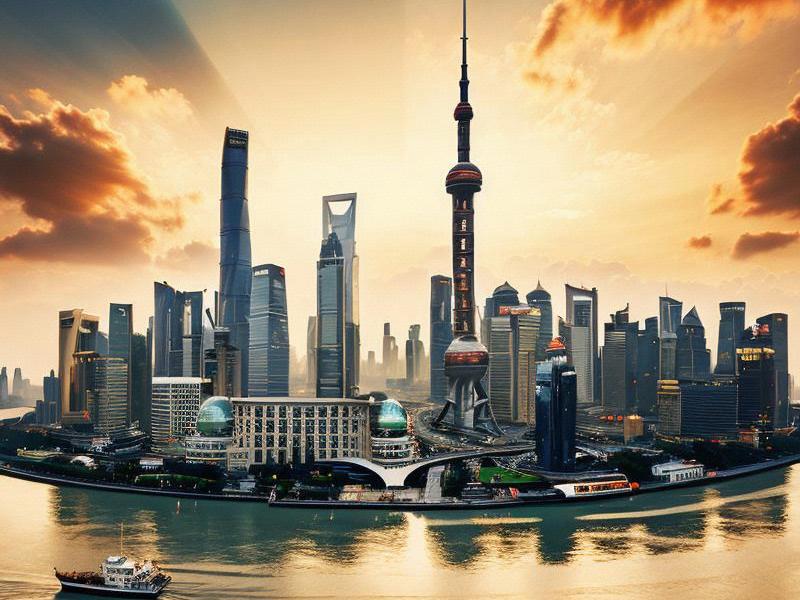This article provides a comprehensive overview of Shanghai, highlighting its transformation from a small fishing village to a global metropolis. It delves into the city's economic significance, cultural diversity, urban development, and its role as a major financial center.

Shanghai, often referred to as the "Pearl of the Orient," stands as a beacon of China's economic and cultural prowess. This vibrant city, with its rich history and rapid modernization, has become a symbol of China's rise on the global stage. From its humble beginnings as a fishing village, Shanghai has evolved into one of the world's most dynamic and influential cities.
Economic Significance
Shanghai's economic significance cannot be overstated. It is the largest city in China and serves as the country's primary financial hub. The city's strategic location along the Yangtze River Delta has made it a crucial center for trade and commerce. Shanghai's port, the busiest container port in the world, handles a significant portion of China's imports and exports, making it a linchpin in global supply chains.
The city is home to the Shanghai Stock Exchange, one of the largest stock exchanges in Asia, and is a major hub for foreign direct investment. Numerous multinational corporations have established their regional headquarters in Shanghai, attracted by the city's business-friendly environment, skilled workforce, and robust infrastructure. Industries such as finance, manufacturing, technology, and real estate thrive in Shanghai, contributing to its status as an economic powerhouse.
Cultural Melting Pot
Shanghai's cultural diversity is one of its defining characteristics. Known as the "Paris of the East," the city boasts a unique blend of traditional Chinese culture and Western influences. This cultural fusion is evident in the city's architecture, cuisine, art, and lifestyle.
阿拉爱上海 The Bund, a historic waterfront area, showcases a stunning array of colonial-era buildings that reflect Shanghai's rich history as a trading port. In contrast, the futuristic skyline of Pudong, with its iconic skyscrapers like the Oriental Pearl Tower and the Shanghai Tower, symbolizes the city's modernity and ambition.
Shanghai's culinary scene is equally diverse, offering everything from traditional Shanghainese dishes like xiaolongbao (soup dumplings) and shengjianbao (pan-fried buns) to international cuisines. The city's vibrant arts scene includes world-class museums, theaters, and galleries, such as the Shanghai Museum and the Power Station of Art, which host exhibitions and performances that attract visitors from around the globe.
Urban Development
Shanghai's urban development is a testament to the city's innovative spirit and commitment to sustainability. The city has undergone remarkable transformations over the past few decades, with extensive infrastructure projects aimed at enhancing its functionality and livability.
The Maglev train, the world's fastest commercial high-speed train, connects Shanghai to its international airport, Pudong International Airport, in just 8 minutes. The city's extensive metro system, one of the busiest in the world, provides efficient and convenient transportation for millions of residents and visitors daily.
Shanghai is also at the forefront of green urban development. The city has implemented various initiatives to promote energy efficiency, reduce pollution, and enhance public transportation. The Lujiazui Financial District, with its eco-friendly buildings and green spaces, exemplifies Shanghai's commitment to sustainable urban living.
上海龙凤419油压论坛
Role as a Global City
As a global city, Shanghai plays a pivotal role in international affairs and cultural exchange. It is a member of the World Expo Cities Network and has hosted numerous international events, including the 2010 World Expo, which attracted millions of visitors from around the world. These events have not only boosted Shanghai's international profile but also fostered global cooperation and understanding.
Shanghai is also a major center for education and research, with prestigious universities and research institutions that attract students and scholars from around the globe. The city's vibrant startup ecosystem and tech innovation hubs, such as Zhangjiang Hi-Tech Park, have made it a hub for technological advancements and entrepreneurship.
Challenges and Opportunities
Despite its many achievements, Shanghai faces several challenges in its journey towards becoming a global leader. Rapid urbanization has led to issues such as housing shortages, traffic congestion, and environmental concerns. The city government has been proactive in addressing these challenges through innovative policies and sustainable development practices.
上海花千坊龙凤 One of the key opportunities for Shanghai lies in its ability to leverage its strengths in finance, technology, and culture to drive further growth and innovation. The city's strategic location and robust infrastructure make it an ideal platform for international trade and investment. By continuing to embrace globalization and fostering a business-friendly environment, Shanghai can solidify its position as a global economic powerhouse.
Conclusion
Shanghai's transformation from a small fishing village to a global metropolis is a remarkable story of resilience, innovation, and ambition. Its economic significance, cultural diversity, urban development, and role as a global city make it a unique and influential place on the world stage.
As Shanghai continues to evolve, it faces both challenges and opportunities that will shape its future. By addressing its challenges and leveraging its strengths, the city can ensure sustainable growth and maintain its position as a leading global city.
In conclusion, Shanghai is not just a city; it is a symbol of China's rise and a testament to the power of urbanization and modernization. Its rich history, vibrant culture, and dynamic economy make it a must-visit destination for anyone seeking to understand the complexities and opportunities of contemporary China.